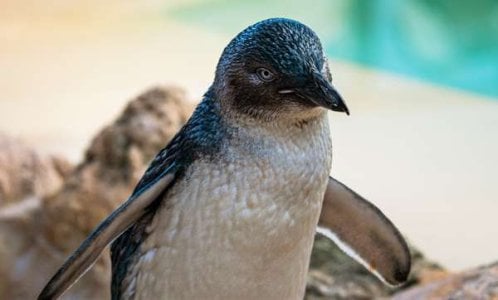Could tourism be pushing this species to the brink? Residents demand action
By
Maan
- Replies 2
A growing environmental crisis has sparked a heated debate among locals and experts alike. What was once a popular destination is now at the centre of a passionate call for change.
The issue is far from straightforward, with conflicting views on what’s best for both nature and tourism.
What comes next could shape the future of this unique location.
The WA government faced pressure to ban recreational boating and tourism on Penguin Island, located 53 km south of Perth, in a bid to protect the dwindling population of little penguins.
Currently, only 114 little penguins remained on the island, marking a dramatic 94 per cent decline in their population since 2007, according to Save Rockingham's Little Penguins activist Dawn Jecks.
Ms Jecks pointed out that while climate change posed a threat to the penguins’ habitats, tourism had long been prioritised over their welfare.
She explained that tourists had free rein over the areas where penguins sought refuge, leaving the birds with little space to cool off.
'It’s essentially open slather in terms of visitors accessing the areas where the penguins try to cool off,' she said.
'There’s nowhere on the beach they can go where they’re not going to be hounded, touched or picked up by visitors.'
As a result, the penguins had to take shelter under boardwalks, waiting until after 4:00 pm when the last ferry departed to venture out of their nests.
Ms Jecks revealed that about 130,000 people visited Penguin Island each year, with peak tourism coinciding with the penguins’ moulting season.
During moulting, the penguins stopped feeding for two weeks to grow new feathers, a period that occurred in summer’s highest temperatures, putting the birds at risk of hyperthermia and death.
'The trouble is, the moulting occurs in the summer when temperatures are at their highest, they’re extremely stressful conditions often resulting in hyperthermia and fatality,' Ms Jecks said.
Ms Jecks also noted that boat strikes accounted for 25 per cent of little penguin deaths, with watercraft numbers increasing in the area in recent years.
'They need to close down the island for a few years to let the population recover,' she urged.
She further highlighted the irony of the situation, referencing Penguin Island’s symbolic importance to Rockingham, home to penguins featured on the city's coat of arms and local signage.
'How stupid is it going to look when we have Penguin Rd, penguins on the entry sign to Rockingham, penguins on the city’s coat of arms and penguins on the kid’s school jumpers but no penguins,' she said.
Save Rockingham's Little Penguins had called on the state government to enforce a ban on tourism and recreational boating around the island to give the little penguins a fighting chance.
A study conducted by the University of Western Australia’s Dr Belinda Cannel found that the penguin population was primarily confined to coastal areas heavily used by humans for activities like fishing, boating, and water sports.
The study noted that the human population in Rockingham had almost doubled over the years, with boat ownership being the second highest across Perth’s 30 local government areas.
The report raised concerns about the increasing human usage of coastal waters and its potential impact on the penguins.
Tourism operator Chad D’Souza, who had been in the region for around 30 years, argued that tourists were not the problem.
He instead called for government action to fund a new discovery centre on the mainland to educate visitors on local wildlife.
Mr D’Souza lamented that a facility on the island, previously used for this purpose, had been demolished, with no new facility built despite government promises.
He criticised the authorities for diverting funds to office buildings and toilets instead of conservation efforts.
'The wild penguins on the island are there and they are depleting, but that is not because of a tourist walking on a footpath, it is because of global warming and not being provided enough fish by authorities,' he said.
Mr D’Souza expressed support for the island’s closure as a conservation area, as long as the government kept its promise to fund the discovery centre.
He emphasised that such a facility would allow for year-round education and provide an opportunity to showcase other wildlife species, including sea lions and dolphins.
A spokesperson for the WA government stated that Penguin Island was an iconic part of the state, with authorities committed to preserving the penguin population.
The government had already implemented measures such as extending the winter closure period and closing the island to visitors during extreme heatwaves.
Research suggested that a primary cause of the penguin decline was a reduction in food sources due to warming sea temperatures.
'The health and wellbeing of the penguins will always be the state government’s top priority when it comes to planning for the island,' the spokesman said.
While acknowledging the importance of tourism, the spokesman reiterated the role it played in educating visitors about the penguins and fostering appreciation for the natural environment.
The government had also committed to developing a business case and concept design for a potential discovery centre at Mersey Point in Rockingham, which was still under development.
'Consultants have been appointed to undertake this work which is currently underway, and this is expected to be completed in coming months,' the spokesman added.

As the debate continues, the question remains: can we balance tourism with wildlife conservation, or will we lose this iconic species forever? Share your thoughts in the comments.
The issue is far from straightforward, with conflicting views on what’s best for both nature and tourism.
What comes next could shape the future of this unique location.
The WA government faced pressure to ban recreational boating and tourism on Penguin Island, located 53 km south of Perth, in a bid to protect the dwindling population of little penguins.
Currently, only 114 little penguins remained on the island, marking a dramatic 94 per cent decline in their population since 2007, according to Save Rockingham's Little Penguins activist Dawn Jecks.
Ms Jecks pointed out that while climate change posed a threat to the penguins’ habitats, tourism had long been prioritised over their welfare.
She explained that tourists had free rein over the areas where penguins sought refuge, leaving the birds with little space to cool off.
'It’s essentially open slather in terms of visitors accessing the areas where the penguins try to cool off,' she said.
'There’s nowhere on the beach they can go where they’re not going to be hounded, touched or picked up by visitors.'
As a result, the penguins had to take shelter under boardwalks, waiting until after 4:00 pm when the last ferry departed to venture out of their nests.
Ms Jecks revealed that about 130,000 people visited Penguin Island each year, with peak tourism coinciding with the penguins’ moulting season.
During moulting, the penguins stopped feeding for two weeks to grow new feathers, a period that occurred in summer’s highest temperatures, putting the birds at risk of hyperthermia and death.
'The trouble is, the moulting occurs in the summer when temperatures are at their highest, they’re extremely stressful conditions often resulting in hyperthermia and fatality,' Ms Jecks said.
Ms Jecks also noted that boat strikes accounted for 25 per cent of little penguin deaths, with watercraft numbers increasing in the area in recent years.
'They need to close down the island for a few years to let the population recover,' she urged.
She further highlighted the irony of the situation, referencing Penguin Island’s symbolic importance to Rockingham, home to penguins featured on the city's coat of arms and local signage.
'How stupid is it going to look when we have Penguin Rd, penguins on the entry sign to Rockingham, penguins on the city’s coat of arms and penguins on the kid’s school jumpers but no penguins,' she said.
Save Rockingham's Little Penguins had called on the state government to enforce a ban on tourism and recreational boating around the island to give the little penguins a fighting chance.
A study conducted by the University of Western Australia’s Dr Belinda Cannel found that the penguin population was primarily confined to coastal areas heavily used by humans for activities like fishing, boating, and water sports.
The study noted that the human population in Rockingham had almost doubled over the years, with boat ownership being the second highest across Perth’s 30 local government areas.
The report raised concerns about the increasing human usage of coastal waters and its potential impact on the penguins.
Tourism operator Chad D’Souza, who had been in the region for around 30 years, argued that tourists were not the problem.
He instead called for government action to fund a new discovery centre on the mainland to educate visitors on local wildlife.
Mr D’Souza lamented that a facility on the island, previously used for this purpose, had been demolished, with no new facility built despite government promises.
He criticised the authorities for diverting funds to office buildings and toilets instead of conservation efforts.
'The wild penguins on the island are there and they are depleting, but that is not because of a tourist walking on a footpath, it is because of global warming and not being provided enough fish by authorities,' he said.
Mr D’Souza expressed support for the island’s closure as a conservation area, as long as the government kept its promise to fund the discovery centre.
He emphasised that such a facility would allow for year-round education and provide an opportunity to showcase other wildlife species, including sea lions and dolphins.
A spokesperson for the WA government stated that Penguin Island was an iconic part of the state, with authorities committed to preserving the penguin population.
The government had already implemented measures such as extending the winter closure period and closing the island to visitors during extreme heatwaves.
Research suggested that a primary cause of the penguin decline was a reduction in food sources due to warming sea temperatures.
'The health and wellbeing of the penguins will always be the state government’s top priority when it comes to planning for the island,' the spokesman said.
While acknowledging the importance of tourism, the spokesman reiterated the role it played in educating visitors about the penguins and fostering appreciation for the natural environment.
The government had also committed to developing a business case and concept design for a potential discovery centre at Mersey Point in Rockingham, which was still under development.
'Consultants have been appointed to undertake this work which is currently underway, and this is expected to be completed in coming months,' the spokesman added.
Key Takeaways
- Locals are calling for a tourist ban on a popular island near Perth to protect a rapidly declining species.
- The island's penguin population has plummeted by 94 per cent, with tourism and climate change seen as key factors.
- Activists argue that increased visitor traffic and boat strikes are threatening the penguins’ survival.
- While the government has introduced some protective measures, many feel more drastic actions are necessary to ensure the species’ recovery.
As the debate continues, the question remains: can we balance tourism with wildlife conservation, or will we lose this iconic species forever? Share your thoughts in the comments.








